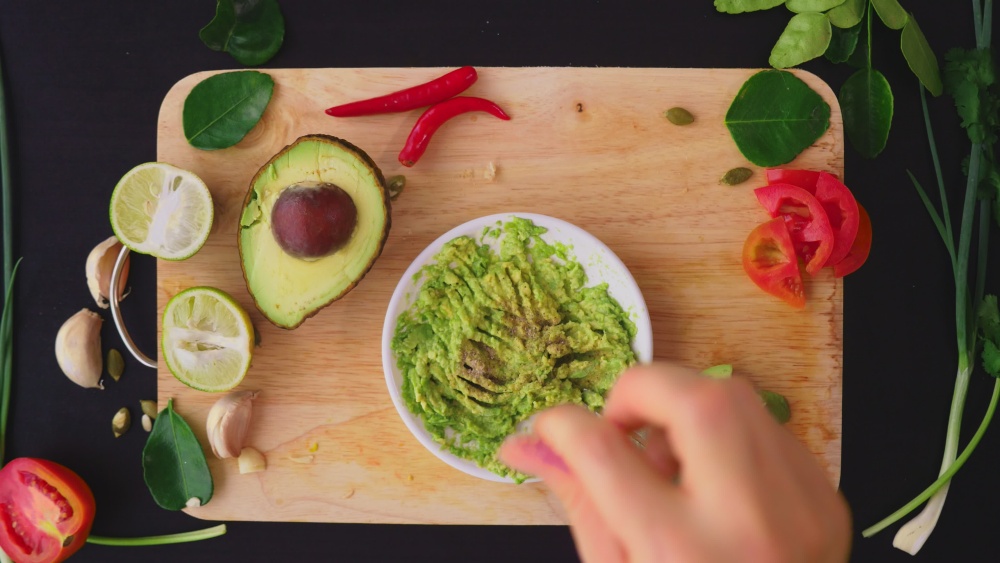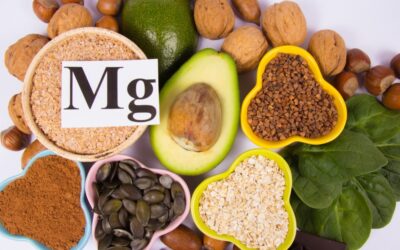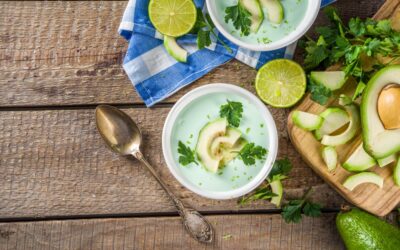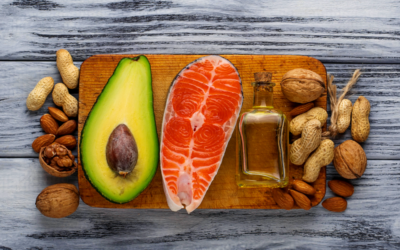Move aside, apples, because there’s a new health-conscious favorite in town that’s ready to steal the spotlight. Enter avocados, the green wonders that can humbly boast about their irresistible taste and creamy texture. But even more so about their health benefits. From promoting heart health to boosting brain function, these nutrient-packed fruits are a delicious addition to your diet that will leave you feeling both satisfied and virtuous. So, let’s peel back the layers and explore the incredible ways avocados can work their magic on your brain health, mental health, and overall well-being.
Avocado, also known as alligator pear, is a bright green fruit that has become popular in recent years. It has a buttery, creamy texture with a mild earthy, grassy, and nutty flavor encased in a bumpy, leathery outer skin.
It is the star ingredient in a wide range of popular dishes, which explains why the consumption of avocado has increased to more than 8 pounds per person in the U.S. alone.
But the taste isn’t this oval-shaped fruit’s only appeal.
Avocados are a good-for-you superfood that’s great to add to most diets. We’ll shed light on its many health benefits, but first, let’s familiarize ourselves with —
The Avocado Nutrition Profile
Avocados are a great source of many nutrients, but they also contain anti-inflammatory and antioxidant compounds that are essential for overall health. Here’s the nutrition breakdown of 100 grams of avocado according to FoodData Central:
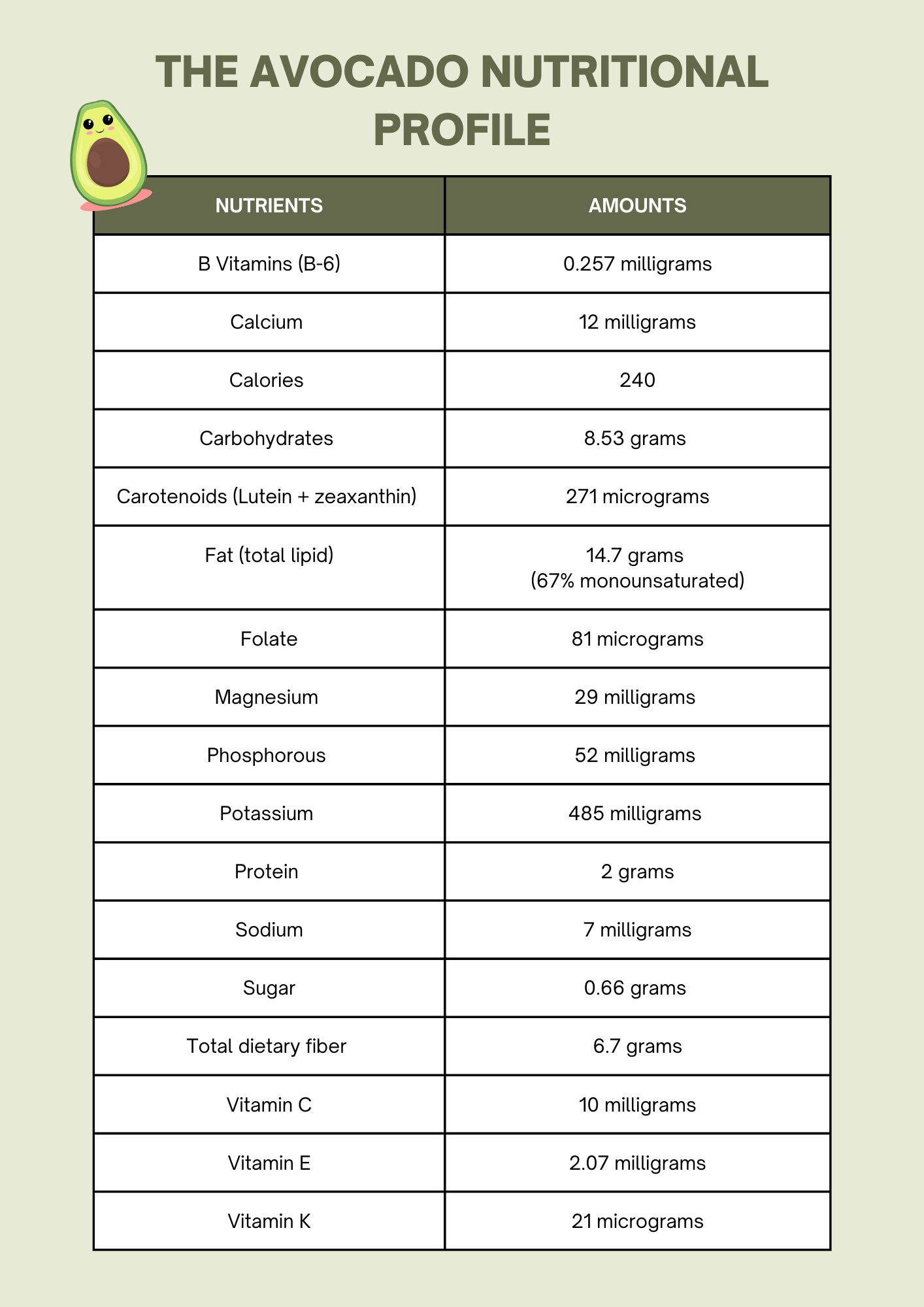
Benefits of Avocado
Here are some reasons why you need to include avocados in your diet:
Ensure Bone Health
Just half an avocado can help you meet 25% of your daily amount of vitamin K, an essential nutrient for bone health. It also stimulates antioxidant activity via saponins, which prevents OVX-induced bone loss. However, to cement this claim, research needs to be conducted on human participants to see the full extent of its benefits.
Great for Vision
Avocados contain lutein and zeaxanthin, carotenoids that cross the blood-brain barrier. They act as a blue light filter, protecting your eye tissue from UV damage, and possibly filling the role of antioxidant and anti-inflammatory agents.
Hence, avocado consumption can be crucial for visual function and health.
Help Maintain Healthy Body Weight
Avocados have high amounts of healthy fat and fiber, so they can help you feel fuller for longer which can inhibit food intake. Plus, there is virtually no risk associated with overconsumption so it can be a crucial dietary addition for weight regulation.
Improve Gut Health
According to a 2021 article, incorporating avocados — a fruit rich in dietary fiber and monounsaturated fatty acids — in your diet could help lower fecal bile acid concentrations and increase bacterial diversity (Faecalibacterium, Lachnospira, and Alistipes). Hence, it can reduce intestinal inflammation and enhance your gut health.
It can also reduce the risk of acid-associated tumorigenic activity, lowering one’s chances of getting colorectal cancer which accounts for around 10% of cancers globally.
Keep Cancer at Bay
Avocados contain high levels of phytochemicals like carotenoids, which have a strong chemopreventive and anti-cancer effect across most cancer types.
This fruit also contains very high levels of monounsaturated fats which can reduce your risk for certain cancers, including colorectal, lung, and bladder cancer. Its folate content can suppress some types of cancers during their early stages but it might also play a dual role in cancer initiation and progression.
Prevent Chronic Diseases
A new trial suggests that consuming avocados could reduce the risk of chronic conditions, including visceral adiposity. While the research was conducted by the HASS Avocado Board (which means there’s a risk of bias), the claim actually has a leg to stand on.
According to a 2018 research, eating avocados could:
- Lower body weight and BMI by 3%, increase meal satisfaction by 23%, and drop the desire to eat by 28% — which helps in weight management
- Improve blood lipids and reduce the risk of CVD
- Reduce total cholesterol by 6.5 mg/dL
- Improve postprandial glycemia and insulinemia
- Lower the risk for metabolic syndrome by 50%
Reduce the Risk of Depression
Avocados contain a good amount of folate which prevents the buildup of homocysteine — an amino acid that damages the lining of arteries and promotes blood clots. Since low levels of folate may be a risk factor for depression and homocysteine metabolism can be a cause for cognitive dysfunction and depression, adding avocados to your diet could help put you in a better mood.
Reduce the Risk of Heart Disease
One avocado weighing 173 grams can contain an impressive 132 milligrams of β-sitosterol, a phytosterol that offers protective properties against myocardial I/R injury and other heart ailments by lowering cholesterol levels in the body.
It also decreases the circulation of oxLDL (which can promote atherosclerosis), so eating a diet rich in avocados could reduce your risk for cardiovascular diseases (CVDs).
To top it off, its potassium content relaxes the walls of the blood vessels, which can help decrease your blood pressure and protect against muscle cramping.
Support Maternal and Fetal Health
Avocados contain folate, potassium, and fiber, which can lower the risk of hypertension, dyslipidemia, and gestational diabetes. It can thus improve maternal health while reducing pregnancy and birth complications in certain cases.
Folate is also essential for the growth and development of the fetus. According to the Centers for Disease Control and Prevention (CDC), it helps form the neural tube and can keep anencephaly (underdevelopment of the fetus’ brain and skull), spina bifida (split spine), and other birth defects at bay. Note that this requires an adequate consumption of 400 micrograms for mothers who are of reproductive age.
How To Incorporate Avocado Into Your Diet
Avocados make healthy snacks. Here are 12 delicious ways to enjoy it:
- Add cubed avocados to smoothies, tacos, and burritos.
- Bake avocado fries, and enjoy them alongside dipping sauces for added pizzazz.
- Fill sushi rolls with thin avocado slices.
- Increase the fiber and fat content of your hummus by combining chickpeas, tahini, and EVOO with creamy avocado.
- Pickle avocados with white vinegar, water, and salt. Flavor them with aromatics, spices, herbs, and seasonings.
- Spread puréed avocado on top of toast or sweet potato to give your diet avocado vitamins and minerals.
- Use them in stuffed eggs topped with bacon and sprinkled with spices.
- Substitute mayo with avocados as a binder in salads. You can use it to top chicken breasts for a powerful protein punch.
- Switch bananas with avocados when making your favorite bread.
- Top your soups and stews with avocado slices.
- Use avocados in guacamole flavored with lime, salt, herbs, spices, and vegetables.
- Use avocados to make a dairy-free chocolate mousse or as a sour cream substitute for baked potatoes.
- Make a decadent avocado soup with our unique recipe
Or, you can cut it into chunks, season them to perfection with a pinch of salt and pepper, and drizzle them with EVOO for a simple snack. Just make sure to eat it in moderation, as avocado calories can add up over time.
Conclusion: Avocados — Packed with Flavor and Health Benefits
Avocado is a fruit that delivers lots of flavor and health benefits.
However, keep in mind that avocados are high in vitamin K, which is involved in hemostasis. So, it can decrease the effectiveness of warfarin, an anticoagulant medication that prevents clotting. It’s also a no-no for those with latex allergies.
If in doubt, it’s always best to check with your healthcare practitioner to ensure that you get all of the avocado’s benefits without any undesirable side effects.
More Articles You May Be Interested In:
A Guide to Magnesium: The Mineral That Can Do a 180 on Your Health
Magnesium is an essential nutrient required to maintain overall health. However, nearly half of Americans don’t meet daily magnesium intake recommendations. Magnesium deficiency is associated with several diseases. It is vital to ensure your food intake boosts the...
Step by Step Guide To Growing Broccoli Sprouts
Sprouting Goodness: A Step-by-Step Guide to Growing Broccoli Sprouts Broccoli sprouts are miniature nutritional powerhouses that pack a punch of health benefits. Bursting with vitamins, minerals, and antioxidants, these tiny green sprouts are known to have 10-100...
Changing Food Behavior: Get out of Food Prison
Changing Food Behavior: Easily Give Up Junk Food Changing a food behavior, particularly one that activates the brain’s reward pathways—such as binging on ice cream or sugary drinks while watching a movie, requires an insane amount of willpower. It’s tough to change...
Grilled Mackerel Fish Taco Recipe
Grilled Mackerel Fish Tacos Grilled Mackerel Fish Tacos are a favorite recipe we have adapted from traditional Mexican cuisine. Instead of using tilapia or cod, we have added mackerel for its high concentration of healthy omega 3. It’s so good for brain health! In...
Avocado Cold Summer Soup Recipe
Avocado Cold Summer Soup Recipe Avocado Cold Summer Soup is refreshing when the temperatures begin to rise. This soup can be created with chicken stock or vegetable stock presenting a vegetarian option. Enjoy Avocado Cold Summer Soup as a starter for just about any...
Lemon Garlic Salmon Recipe
Lemon Garlic Salmon Lemon Garlic Salmon has a Mediterranean vibe! Here we’ve added a drizzle of olive oil, lemon, and oregano to create a light and lively dish. This recipe is created for two people based on suggested serving sizes of 3 to 4 ounces of salmon per...
Maple Roasted Salmon Recipe
Maple Roasted Salmon Maple Roasted Salmon is so delicious and easy to make. We are sure you’ll want to add this recipe to your menu plan each week. Searing salmon in a pan before baking it in the oven helps to lock in juices and flavor. Why is salmon so good for the...
Health Benefits of Broccoli Sprouts
Broccoli Sprouts Broccoli sprouts may be small in size, but they pack a powerful punch when it comes to health benefits. These tiny sprouts are loaded with nutrients and antioxidants that can help protect against a range of health issues, from cancer to heart disease....
Health Benefits of Omega 3 Fatty Acids
Health Benefits of Omega-3 Fatty Acids and Recommended Foods Omega-3 fatty acids are an integral part of cell membrane phospholipids. They provide structure, act as a barrier to protect cells from environmental aggression, and influence various bodily functions to...
Benefits and Harms of Dietary Fat
Fat is one of three macronutrients found in food that is essential for cell survival in humans. However, it is often demonized as being “unhealthy”. But that couldn’t be further from the truth. Some fats have been linked to improved cognition and decreasing the risk...

